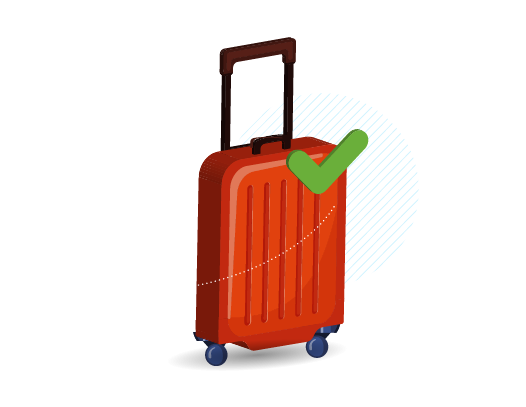
Quicklinks
Top Results

Your vacation is finally booked and on the calendar. As you prepare, consider adding a few money steps to your vacation checklist before you travel. After all, accessing, protecting, and controlling your money is an important part of your travel plans.
These money tips can help you when traveling in North Carolina, across the country or to places overseas.
1: Tell your credit union or bank
This is an important step when traveling anywhere to avoid declined charges or interrupted access to your money. Credit unions and other financial institutions have a steady drumbeat of fraud monitoring in the background at all times. This means that a debit card charge in Seattle, Washington may be declined if you live in Wilmington, North Carolina and did not inform your financial institution of any travel plans. The same applies to credit card transactions. To prevent this from happening, go to your online banking and securely share your travel dates and locations. Or you can call the member or customer service phone number for help. Taking this step will help you avoid any charge-related delays during your trip.
2: Control your cards
Mobile apps and online banking have features and tools that help you set spending limits and select real-time notifications of activity. At Civic, Control+ is our mobile app that helps you set permissions and limits while traveling or for everyday use. The app lets you control your transaction amounts and limits for merchant types or location, detect unauthorized or fraudulent activity with immediate alerts after all transactions, and set permissions for when your cards will work — turning them on and off at any time, for any reason. This is a proactive way to control how and when your cards can be used during travel to help stay on budget.
3: Take steps to help prevent skimming
Criminals have been using devices to steal account and password information from the magnetic strip on cards for a long time—and it can happen anywhere. To help prevent this, EMV chip card technology is now used on newer credit and debit cards. The chip creates a unique transaction each time you use the card and makes it harder for criminals to steal your information. A few months before your trip, make sure your cards have an EMV chip or chip-and-pin functionality. If your current card doesn’t have a chip, request a newer card with that technology. Also, consider using a contactless payment method that uses near field communication (NFC) that uses your phone’s password, facial recognition or fingerprint to secure the transaction. A common NFC is Apple Pay or others like it.
4: Carry a small amount of cash
Having cash on-hand helps provide a backup plan in case your debit or credit card does not work. It also gives you flexibility by having small bills on-hand for tipping and any miscellaneous needs while traveling. If you will be traveling to another country, see tip number six 6!
5: Get travel insurance
This to-do item can help protect your vacation investment. Trip cancelation is not the only purpose of travel insurance. It helps protect your health and any travel issues that might come up such as delays, lost luggage and a lot more. Do your research early about the different types of travel insurance and which options you may need. For a weather-dependent vacation, consider cancel for any reason upgrades. You will pay more but it may be worth it for a special trip. And finally, all travel insurance companies offer 24/7 travel assistance or concierge services which can be used before and during your trip. These may include event and transportation reservations and more that can help you save time and money.
6: Plan to exchange money
If your trip is overseas, plan to place an exchange request well in advance of your trip. Call around to your local resources to know how your community is handling the exchange of money. If a local financial institution does have onsite currency, the small fee for non-account holders may be worth the convenience. If you cannot exchange currency before your trip, bring U.S. dollars with you to exchange at your final destination.
7: Save for your next trip
The best way to face the world again after an amazing vacation is to start thinking about planning your next trip. Part of that process includes keeping your savings routine active and on track. There are tools available in online banking that help you set goals and save the money needed to achieve them.
Consider these money tips to help your trip run smoothly and to help you make the most out of your vacation.




